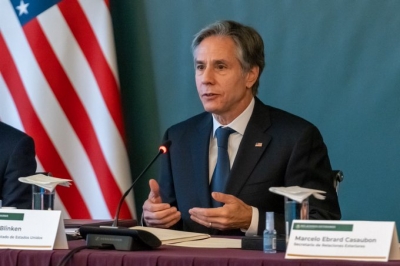New York: The US is ‘deeply concerned’ about the allegations raised by Canadian Prime Minister Justin Trudeau against India on the killing of a Khalistani separatist in Canada, Secretary of State Antony Blinken has said and Washington was “closely coordinating” with Ottawa on the issue and wants to see “accountability” in the case.
Speaking at a press conference here Friday, Blinken said the US has engaged directly with the Indian government on the issue and the most productive thing would be the completion of this investigation.
“Let me say a few things about this. First, we are deeply concerned about the allegations that Prime Minister Trudeau has raised,” the top US diplomat said in response to a question on Trudeau’s allegations against India.
Trudeau said in the Canadian Parliament earlier this week that “Canadian security agencies have been actively pursuing credible allegations of a potential link between agents of the government of India and the killing” of Hardeep Singh Nijjar June 18 in British Columbia.
“We have been consulting throughout very closely with our Canadian colleagues – and not just consulting, coordinating with them – on this issue. And from our perspective, it is critical that the Canadian investigation proceed, and it would be important that India work with the Canadians on this investigation. We want to see accountability, and it’s important that the investigation run its course and lead to that result,” Blinken said.
The top US diplomat was also asked about reports that President Joe Biden brought the issue up with Prime Minister Narendra Modi “personally”. “I’m not going to characterise or otherwise speak to diplomatic conversations that we have,” Blinken said.
“We’ve been engaged directly with the Indian government as well. And again, I think the most productive thing that can happen now is to see this investigation move forward and be completed. And we would hope that our Indian friends would cooperate with that investigation as well.
“More broadly – and you’ve heard me speak to this – we are extremely vigilant about any instances of alleged transnational repression, something we take very, very seriously. And I think it’s important more broadly for the international system that any country that might consider engaging in such acts not do so. So it’s something that we’re also focused on in a much broader way.”
Nijjar, 45, the chief of the banned Khalistan Tiger Force (KTF), was one of India’s most-wanted terrorists who carried a cash reward of Rs 10 lakh on his head and was shot dead outside a gurdwara in Surrey in the western Canadian province of British Columbia June 18.
Tensions flared between India and Canada early this week following Trudeau’s explosive allegations.
India angrily rejected the allegations as “absurd” and “motivated”, and expelled a senior Canadian diplomat in a tit-for-tat move to Ottawa’s expulsion of an Indian official over the case.
While Canada hasn’t yet provided any public evidence to back its claims, a media report citing Canadian government sources said that Ottawa’s allegations are based on both human and signals intelligence and inputs from an ally the Five Eye intelligence network.
The Five Eyes network is an intelligence alliance consisting of the United States, the United Kingdom, Australia, Canada and New Zealand.
The Canadian government has amassed both human and signals intelligence in a months-long investigation of the Sikh man’s death that has inflamed relations with India, CBC News, a division of the Canadian Broadcasting Corporation, reported Thursday quoting sources.
That intelligence includes communications involving Indian officials themselves, including Indian diplomats present in Canada, according to Canadian government sources.
Prime Minister Trudeau on Thursday said Canada is not looking to “provoke or cause problems” with India as he urged New Delhi to take the matter “extremely seriously” and work with Ottawa to “uncover the truth”.
India asked Canada to come down hard on terrorists and anti-India elements operating from its soil and suspended visa services for Canadians.
India also asked Canada to downsize its diplomatic staff in the country, arguing that there should be parity in strength and rank equivalence in the mutual diplomatic presence. The size of Canadian diplomatic staff in India is larger than what New Delhi has in Canada.
The India-Canada ties had been reeling under some strain for the last few months in view of increasing activities of the pro-Khalistani elements in the North American country. India believes the Trudeau government is not addressing its genuine concerns.
PTI






































